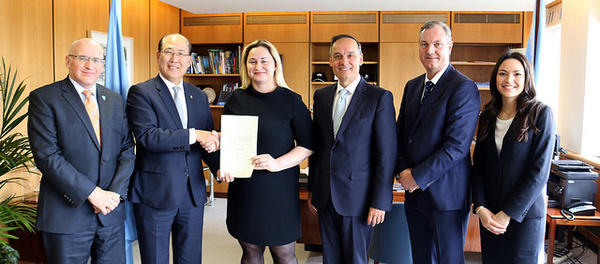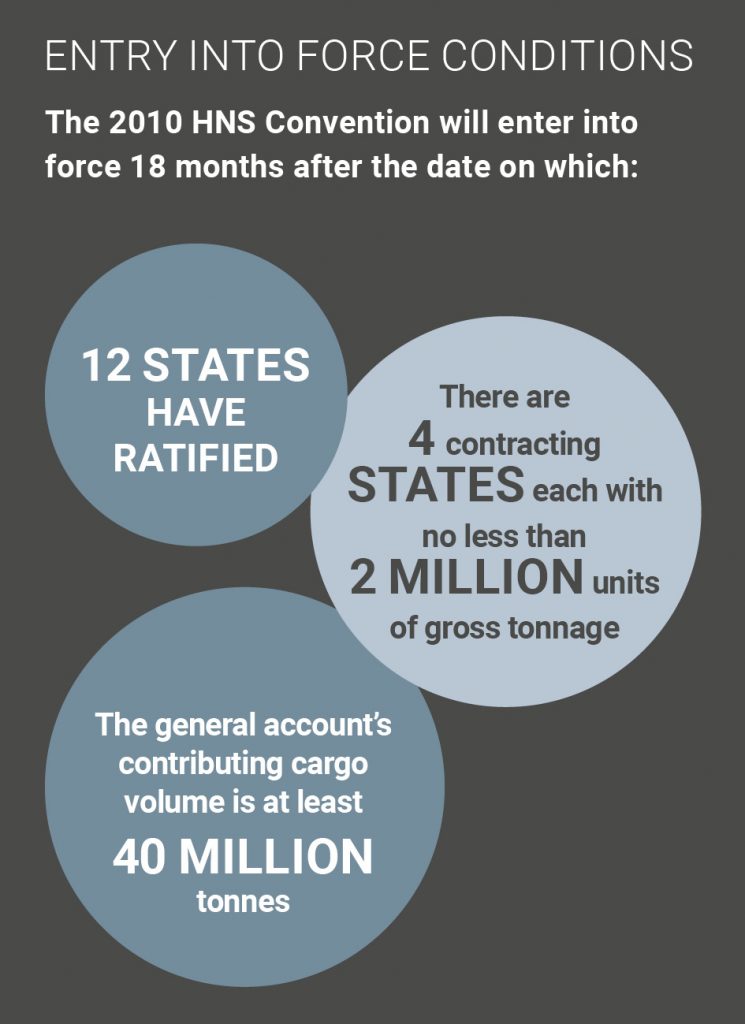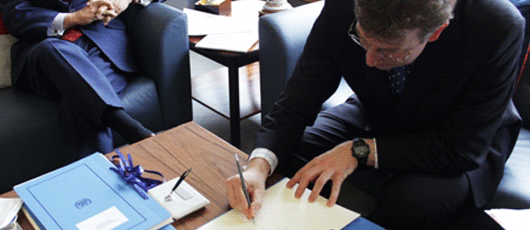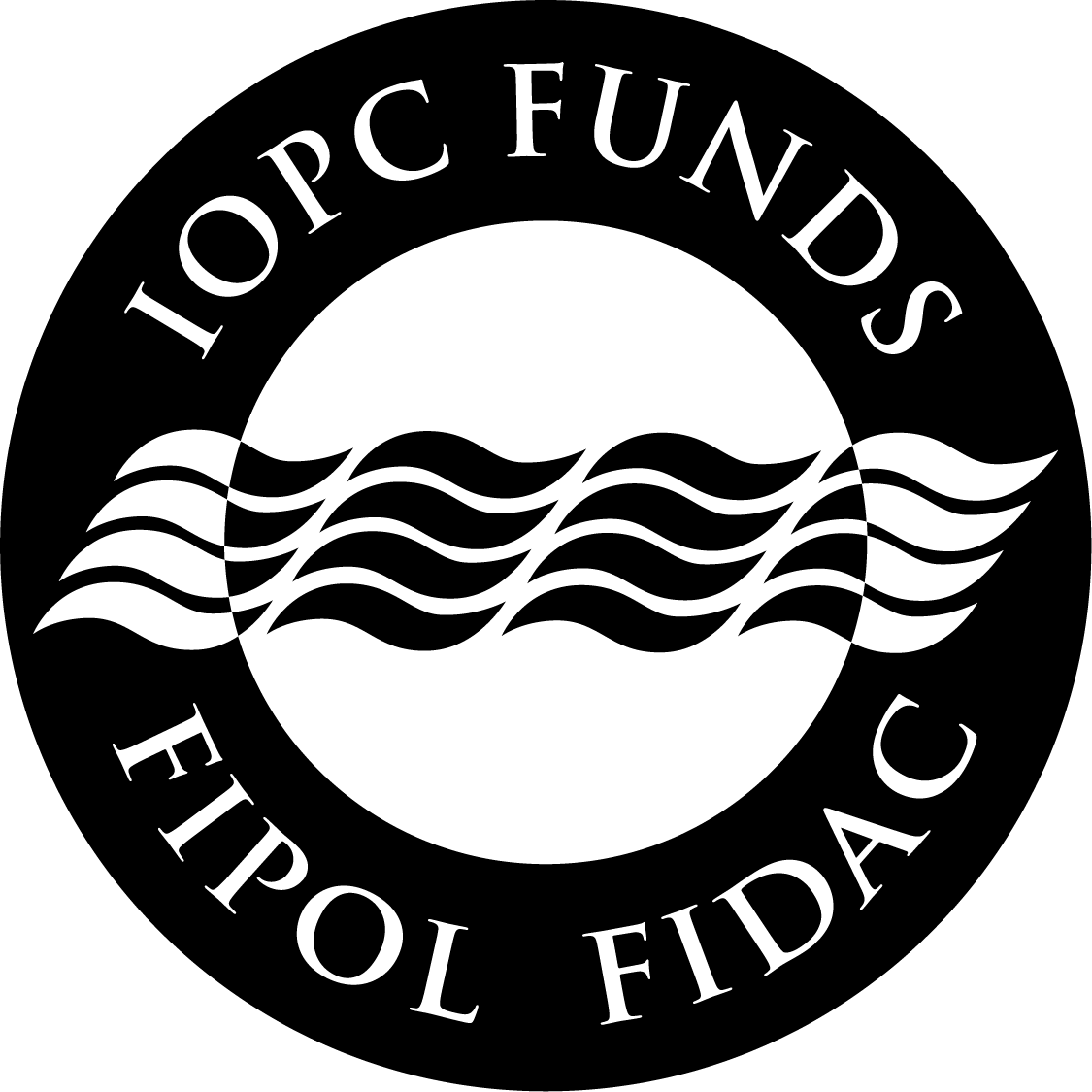Status of the HNS Convention and 2010 Protocol

Ms Dilek Ayhan, State Secretary in the Norwegian Ministry of Trade, Industry and Fisheries, handing an instrument of ratification of the 2010 HNS Protocol to IMO Secretary-General Kitack Lim at the IMO Headquarters.
Entry Into Force
The 2010 HNS Protocol will enter into force 18 months after the date on which it is ratified by at least twelve States, including four States each with not less than 2 million units of gross tonnage, and having received during the preceding calendar year a total quantity of at least 40 million tonnes of cargo that would be contributing to the general account.
Process
The Protocol was open for signature at the headquarters of the IMO between 1 November 2010 and 31 October 2011. It now remains open for accession. Ratification, acceptance, approval or accession is effected by the deposit of an appropriate instrument with the Secretary-General of IMO.
A Contributing Cargo Reporting Form for States and receivers of HNS have been developed to accompany any expression of consent to be bound by the Protocol and is designed to assist in the ratification/accession process only. If a State has not received any HNS contributing cargo, it can submit a nil declaration.

Status of Signature/Ratification
Slovakia became the eighth State to ratify or accede to the 2010 HNS Protocol in November 2023. It joins Canada, Denmark, Estonia, France, Norway, South Africa and Tϋrkiye, who have already deposited instruments of ratification to the Protocol and who are leading the way towards entry into force of the 2010 HNS Convention
Amongst the criteria for the Convention’s entry into force, at least 12 States are required to ratify or accede to the Protocol, four of which must each have a merchant shipping fleet of no less than 2 million units of gross tonnage. Of the eight States so far, four of them do meet that requirement. Regarding the total quantity of at least 40 million tonnes of HNS cargo that would be contributing to the general account, the total figure provided by the eight Contracting States is currently 17.5 million tonnes.
Eight States (Canada, Denmark, France, Germany, Greece, the Netherlands, Norway and Tϋrkiye) signed the 2010 HNS Protocol, subject to ratification, Canada, Denmark, Estonia, France, Norway, South Africa, Slovakia, and Tϋrkiye are the first States to have consented to be bound by the Convention. There has, however, been significant progress reported by a number of other States in recent months and it is anticipated that a number of those States will ratify in the near future.
A key conclusion from the workshop organised by IMO in April 2018 in cooperation with the IOPC Funds, was that, while the current momentum towards entry into force of the Convention was encouraging, the onus was on States to act and make concrete progress towards ratification of the Protocol. That conclusion is reaffirmed at each regular session of the IOPC Funds governing bodies and it is very encouraging to see that States are responding.
At the time of Norway’s ratification on 21 April 2017, the Secretary-General of IMO, Mr Kitack Lim had encouraged other States to follow suit.
‘The HNS Convention is the last piece in the puzzle needed to ensure that those who have suffered damage caused by HNS cargoes carried on board ships have access to a comprehensive and international liability and compensation regime,’ said IMO Secretary-General Kitack Lim. ‘The number of ships carrying HNS cargoes is growing steadily with more than 200 million tonnes of chemicals traded annually by tankers, and we have to recognize that accidents can and do happen. I urge all States to follow the example set by Norway and consider acceding to the HNS 2010 treaty as soon as possible, in order to bring it into force.’
This message has been reiterated by IMO, the IOPC Funds and others at a number of occasions since.
The Director of the IOPC Funds has been given the role of carrying out the tasks necessary to set up the International Hazardous and Noxious Substances Fund (HNS Fund) and making preparations for the first session of the HNS Fund Assembly.
The 1992 Fund Secretariat undertakes a number of administrative tasks in cooperation with IMO in relation to the preparations for the entry into force of the Convention. It also remains available to support States in their efforts to prepare for ratification or accession to the HNS Convention and industry stakeholders on technical issues.

Mr. Kasper Høeg-Jensen, Minister Counsellor, Royal Danish Embassy, London, signed the HNS Protocol 2010 on behalf of Denmark at IMO Headquarters on 14 April 2011.
